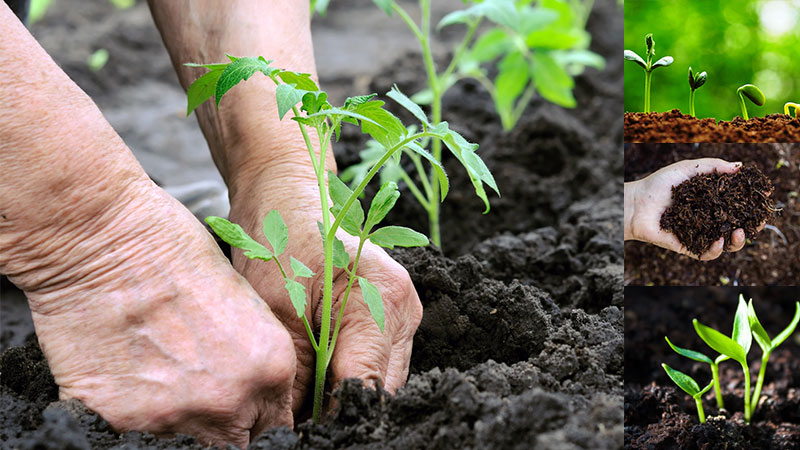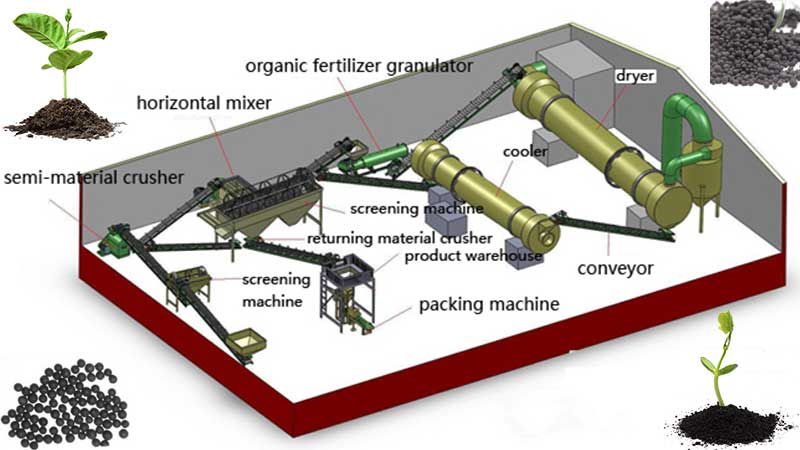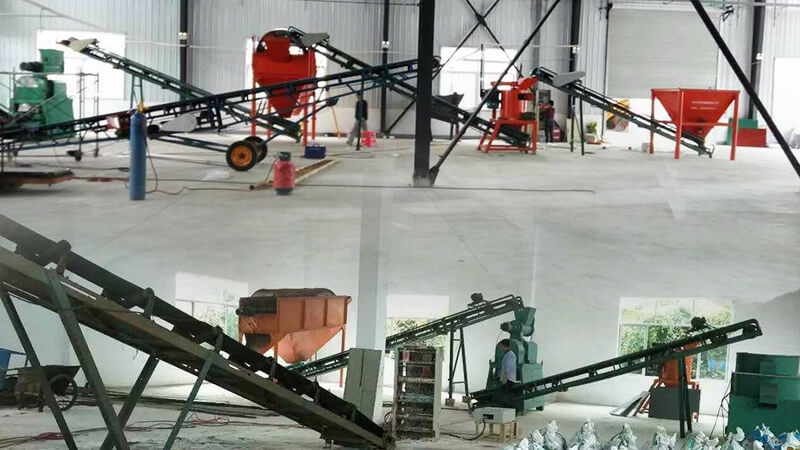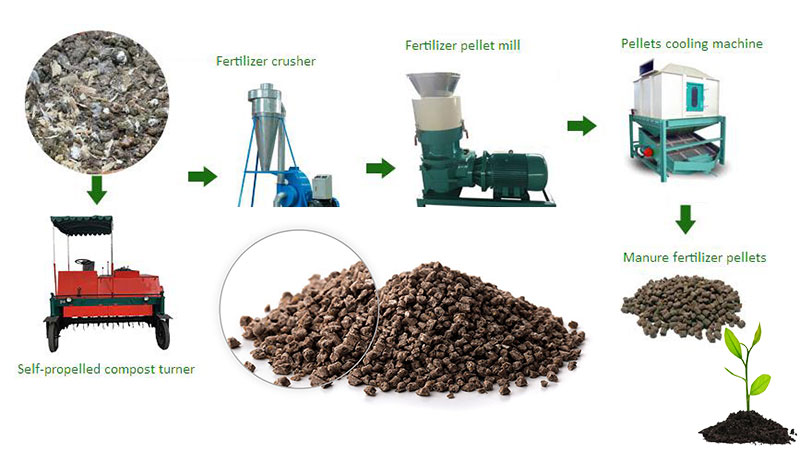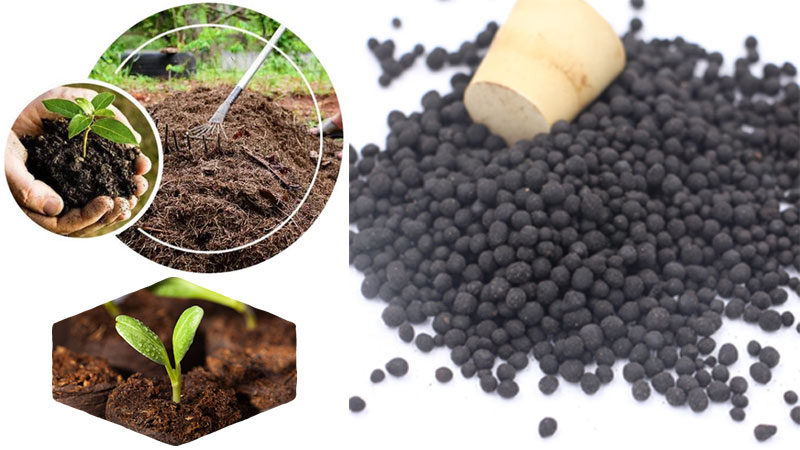Raw materials of organic fertilizer:
1.Feces: chicken, pig, cow, sheep, horse, manure and other animal waste.
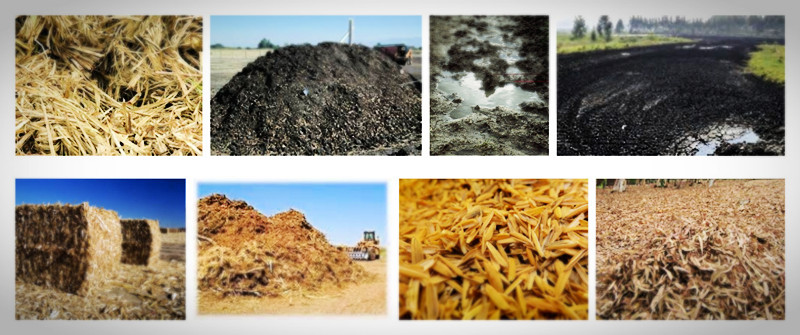
3.Husks and Chaff: rice hull, peanut shells, groundnut stem meal, grain mash and bacterial chaff.
4.Product screenings: alcohol s creenings, furfural, xylose, bacterium, garlic, vinegar, soy sauce
5.Oil-cake materials: soya bean cake, soybean meal, rapeseed expeller and so on.
6.Other materials, such as sewage sludge, sugar filter mud, mud sugar, bagasse.
Organic fertilizers have wide application scope:
Industrial Crops: soybeans, cotton, sesame, sugarcane, tea, tobacco etc. Nurseries & flowers, gardening plants, Chinese medicinal plant etc.
Field Crop: rice, corn, peanuts, wheat and so on. Fruit & Vegetable: citrus, orange, strawberry, longan, pineapple, grapefruit tree, banana, loquat, kiwi, litchi, apple, pear, grapes and so on.
Benefits of Organic Fertilizers
Plant Growth
Organic fertilizers can be easily produced by fertilizer granulator. It provides nutrients necessary for plant growth, with the benefit of being slower-acting and gentler than chemical fertilizers, so that you are less likely to overfeed and chemically burn your plants. Organic fertilizers are not in a form that is immediately absorbed by plants, but rather must be first broken down by soil bacteria and fungi into forms that plants can absorb. This means that, unlike chemical fertilizers, organic fertilizers are not easily washed away in a heavy rainstorm or irrigation session, and that the plants get the benefit of nutrients for growth more evenly over a longer period of time rather than all at once.
Soil Improvement
Increasing organic matter content & the nutrient uptake and utilization in crops, reducing soil hardening, improving soil fertility. Applying organic fertilizer into the soil, organic matter can efficiently improve physical and chemical properties of soil, preserve fertility, and create sound soil-environment for the growth of crops. While chemical fertilizers simply add water-soluble chemicals which are either absorbed by the plant roots or leach away, potentially polluting water resources, organic fertilizers add organic matter that helps the soil to retain moisture and nutrients.
Slow Release of Nutrients
When fertilizers are mixed into the soil, the nutrients are absorbed from the soil by the roots of the plant. In synthetic fertilizers, these nutrients are in ready to use form and when mixed into the soil, can be immediately absorbed by the roots and hence, the plant. There is however a real danger that the roots absorb more nutrients than necessary, causing the roots and plant to burn up. On the other hand, organic fertilizers do not contain nutrients in an easily usable form. When they are mixed into the soil, the microorganisms like bacteria that are in the soil, have to work on the fertilizer, break it up and release the nutrients. This is a slow process and so there is no danger that too many nutrients are ever available to the plant. As such there is low chance for a ‘plant burn’ when organic fertilizers are used.
Long-term Benefits to the Environment
Avoiding environmental pollution & improving rural living conditions. Organic matters, particular in livestock manure and wastes, contains great numbers of pathogen. If not being handled timely, pathogen will spread germs, with the increasing density of ammonium nitrogen, nitrate nitrogen and soluble organic nitrogen in groundwater. It will definitely bring about the environmental degradation, and even endanger the survival of living creatures. Therefore, to great extent, the rational application of organic fertilizers will reduce environmental pollution.
Long-term Benefits to the Soil
Compared with organic fertilizers, chemical fertilizers are manufactured with the sole purpose of helping the growth of a plant. As a result while they may contain a better balance of all the major nutrients that a plant needs, they also contain certain harmful elements that can cause acidity in the soil. While organic fertilizers have positive effects on all types of soil. Looser soils, such as sand, are held together better by a strong root system that nitrogen promotes. In this case, the fertilizer helps plants grow stronger and also helps slow erosion. Soils that are denser and harder to penetrate, such as clay, may be loosened up by a similar root structure. In this case, the soil becomes more easily workable for farming and also more oxygenated to promote photosynthesis.
Cheap and Cost-Effective
Upgrade the production quality. Increase input. Organic fertilizers can be produced at home or on farms by using compost turners, such as hydraulic compost turner, groove type compost windrow turner etc., with raw materials of animal manure along with crops wastes like leaves and dead plants (See more at: homemade organic fertilizers). This is a great way of getting rid of waste from your garden or farm and certainly a cheaper alternative to purchasing chemical fertilizers. Organic fertilizers are rich in organic matter and various nutrients, which provides nutrient to crops. The decomposition of organic fertilizers supply energy and nutrients for the soil microbial activity.
How to properly use organic fertilizer:
Step 1: Till the soil of your garden to a depth of 8 to 12 inches to loosen the dirt and break apart clumps. This will give the roots lots of room to spread out.
Step 2: Apply commercial organic fertilizers over the top of the soil, following the manufacturer’s instructions. The quantity of fertilizer needed will be based on the size of your garden.
Step 3: Add non-manufactured fertilizer, if not using a commercial fertilizer, by layering 2 to 4 inches over the surface of the garden. Non-manufactured fertilizer can include homemade compost, composted manure, well-rotted leaves or grass clippings and clover.
Step 4: Turn the soil to mix in the fertilizer thoroughly. Typically adding fertilizer can be done in the spring, but if you’re using manure, spread it on in the fall and wait until spring to mix it.
Step 5: Add more non-manufactured fertilizer, if desired, and especially if you have sandy or clay soils. Compost and composted manure can improve the quality of your soil by adding nutrients, increasing drainage and lightening the consistency of the soil, allowing roots to move more freely through it.
